
Learn basic keyboarding with this interactive keyboard. The focus is on identifying letter positions on the keyboard. Responses are checked immediately.
- Subject:
- Computer Science
- Technology
- Material Type:
- Game
- Provider:
- ABCya
- Date Added:
- 12/01/2023

Learn basic keyboarding with this interactive keyboard. The focus is on identifying letter positions on the keyboard. Responses are checked immediately.
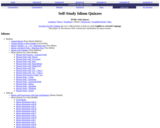
Vast array of quizzes and self-study exercises based on idioms and idiomatic expressions, categorized in a variety of ways (beginning with A, B, etc., by keyword, or by association with other groupings). Great practice for the ELL/ESL student.

The Adaptation series highlights the intersectionality of environmental education, geography, and anthropology. Explore our collection of resources and classroom activities that promote civic action by students to make real connections in their local communities as inspired by the actions in the global examples presented in each episode. These lessons could apply to geography, life science, or environmental science/studies classes, as well as innovation and engineering programs with a human-centered design approach. This Collection features 4 videos and a lesson plan for Grades 6-8, 9-12.

Students will watch three episodes of the UNLADYLIKE2020 series of 26 short films and explore the similarities in issues affecting these women while also identifying the qualities that made them unique. The lessons are about finding common threads between the women, and also between the past and the present. This student-centered lesson follows the '5E' instructional model. Students will explore the lives of these incredible figures through a gallery walk, discuss their findings, research events of the present, and create their own gallery walk to present their research.

The online home of award-winning PBS television series "Art:21" opens a window into the world of contemporary art and artists. Includes a lessons library, downloadable educator guides, examples of student-created projects inspired by the series, artist interviews, videos, and amazing slideshows of the works of dozens of working artists.
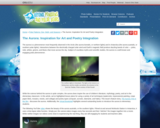
This article lists seven art techniques and four poetry types that can be used to depict and describe the aurora.

Awesome Library's searchable database is full of resources in all subject areas. It also provides information to parents, students, teachers, principal, family, and community.

The BBC helps you learn how to type or just improve on the typing skills you already have in this introduction to touch typing. There are 12 levels to master, then you can test your speed. Teaches correct finger placement.

Are you looking for desktop publishing resources? Tonya Skinner is a business educator who has compiled resources to enrich the business classroom. Resources include: lesson plans, activities, and desktop publishing links.

This page engages students in international issues. Curricular resources and instructional programs bring international public policy to life. Students engage in research and high-level thinking activities that revolve around what is in today's news. Everything necessary for their study is on the web site. There is curriculum for sale on the site, but the Teaching With The News section offers all online materials and has an archive.

The NOVA collection on PBS LearningMedia contains over 1500 resources from NOVA's broadcast and digital productions that educators can use in their lessons to spark and enrich student knowledge of STEM (Science Technology Engineering Mathematics). NOVA's resources are primarily designed for use in middle and high school STEM classrooms. This Collection includes: Video (1121), Document (181), Media Gallery (129), Interactive (72), Audio (4), Lesson Plan (55), Interactive Lesson (24) for Grades All , Resources in Spanish (328).
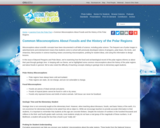
This article describes common misconceptions held by elementary students about the history of the polar regions, fossils, and geologic time. The article provides ideas for formative assessment, teaching strategies, and the National Science Education Standards.
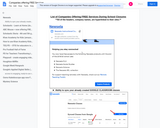
This is a list I began compiling of companies that are now offering FREE services during the school closings. This list is ever evolving so it will change frequently (daily).

This site contains a wealth of useful information for teachers using this book! Includes discussion questions, activities, related books, and links to additional information.
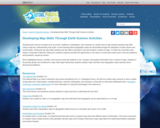
This article highlights lesson plans and activities that help elementary students develop map skills as they learn earth science concepts.

Educators will learn how to adapt their lessons to incorporate simulated experiences that are similar to or completely different from the real world. Educators will explore strategies for bringing learning into a digital 360-degree world.
Approximate time to complete this course is 4 hours. A micro-credential is available from Digital Promise upon completion.

Contains a great deal of historical information about ancient Greece that supports the PBS program "The Greeks- Crucible of Civilization." Includes a timeline, a virtual tour of the acropolis, lesson plans to accompany the show, and more.
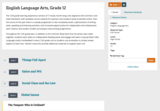
The 12th grade learning experience consists of 7 mostly month-long units aligned to the Common Core State Standards, with available course material for teachers and students easily accessible online. Over the course of the year there is a steady progression in text complexity levels, sophistication of writing tasks, speaking and listening activities, and increased opportunities for independent and collaborative work. Rubrics and student models accompany many writing assignments.Throughout the 12th grade year, in addition to the Common Read texts that the whole class reads together, students each select an Independent Reading book and engage with peers in group Book Talks. Language study is embedded in every 12th grade unit as students use annotation to closely review aspects of each text. Teacher resources provide additional materials to support each unit.

Who decides who among us is civilized? What rules should govern immigration into the United States? Whom should we let in? Keep out? What should we do about political refugees or children without papers? What if they would be a drain on our economy?
ACCOMPLISHMENTS
Students read William Shakespeare’s play The Tempest and write a short argument about who in the play is truly civilized.
Students participate in a mock trial in which they argue for or against granting asylum to a teenage refugee, and then they write arguments in favor of granting asylum to one refugee and against granting it to another.
Students read an Independent Reading text and write an informational essay about a global issue and how that relates to their book.
GUIDING QUESTIONS
These questions are a guide to stimulate thinking, discussion, and writing on the themes and ideas in the unit. For complete and thoughtful answers and for meaningful discussions, students must use evidence based on careful reading of the texts.
What role do national identity, custom, religion, and other locally held beliefs play in a world increasingly characterized by globalization?
How does Shakespeare’s view of human rights compare with that in the Universal Declaration of Human Rights?
Who is civilized? Who decides what civilization is or how it’s defined?
How do we behave toward and acknowledge those whose culture is different from our own?

In this lesson, students will meet with their Granting Refuge Activity groups. Then they’ll meet in one of three groups: teenagers and their defenders, prosecutors, and policy board members. Finally, they’ll go back to their original groups to prepare arguments for the next lesson.